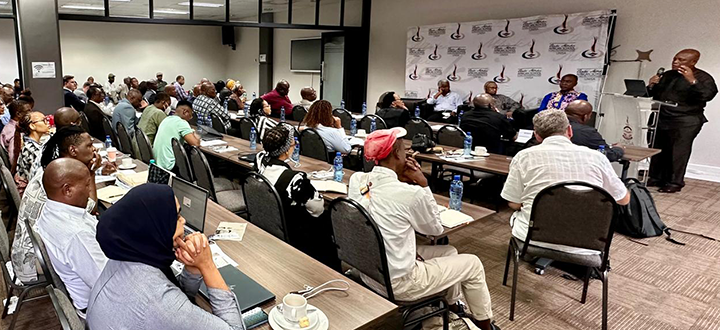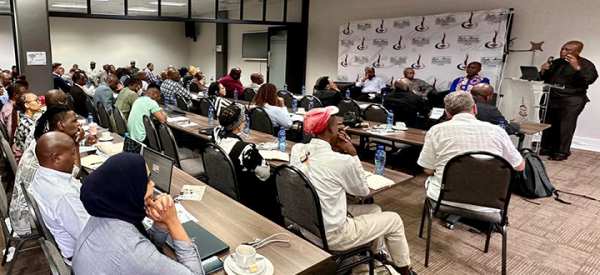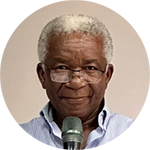
The Thabo Mbeki African School of Public and International Affairs (TM-School) hosted a high-level seminar attended by distinguished guests, including retired ambassadors, retired generals, members of the diplomatic corps and high commissioners, on 13 February 2025 at Kgorong, Unisa main campus, in Pretoria. The purpose of the seminar was to provide "an interim assessment of the instability in the eastern Democratic Republic of Congo (DRC) and the implications for sustainable peace in Africa”.

The seminar was extremely well attended
The seminar was timely, responsive and thought-provoking, creating a conducive space for academics, practitioners and students to engage critically about the protracted DRC conflict. It was held in line with the TM-School’s initiative to nurture and cultivate postdoctoral fellows in their scholarly endeavours, and train African leaders to solve complex problems in Africa and beyond.

Prof Edith Phaswana
Professor Edith Dinong Phaswana, Acting Executive Dean of the TM-School, reminded attendants that the TM-School sought to produce change agents in line with former President Thabo Mbeki’s vision to make the dream of the African Renaissance a reality for the welfare of the African continent. She attributed the DRC conflict to colonisation and called for all efforts seeking to bring peace and security in the DRC to consider the country’s wretched history.
To set the context for the heightened instability in the eastern DRC, Dr Tumba Dieudonne, postdoctoral fellow at the TM-School, maintained that the recent violence in the eastern DRC, particularly the capture of Goma, the capital of North Kivu, by the armed group M23, which is supported by Rwanda, undermines the African Union's (AU’s) goal of silencing the guns in Africa by 2030.

Dr Tumba Dieudonne
Dieudonne asserted that the emergence of the M23 rebel movement and the alleged involvement of the Rwandan army in the conflict goes beyond the denial of Congolese citizenship to the Banyarwanda community, issues of land rights, and Rwandan security concerns. He spoke about the historical background of M23 and highlighted the involvement of Angola, Burundi, Congo, Rwanda and Uganda in the resurgence of M23. He suggested that the Congolese government permitted the Ugandan and Burundian armies to engage their respective rebel groups within Congolese territory without involving the Rwandan army, with adverse consequences for the region. He urged the AU to act promptly to ensure the cessation of hostilities and atrocities that have claimed millions of lives in the DRC.

Former Ambassador Welile Nhlapo
Former Ambassador Welile Nhlapo, a senior political advisor at the African Centre for the Constructive Resolution of Disputes (ACCORD), linked the DRC issue to the country’s mineral resources, the DRC’s affiliation to various regional groups, the country being surrounded by eight countries with various vested and often parochial interests, weak institutions, and a weak government with over 250 ethnic groups. He contended that these complexities should be considered in all efforts aimed at ensuring sustainable and lasting peace in the DRC. He also attributed the ongoing deadly conflict to colonisation and change of leadership. He also highlighted the urgent need for institutional reforms at the level of the United Nations (UN) for it to be fit for the purpose of ensuring international peace and security.

Ambassador Jerry Matjila
Buttressing and augmenting Nhlapo’s critical analysis, Ambassador Jerry Matjila, South Africa’s former permanent representative to the United Nations in New York and Geneva, underscored the importance of understanding the history of the UN. He attributed the challenges to the veto powers of the five permanent members of the UN Security Council (UNSC). Speaking from the UN perspective regarding peace support missions in the DRC, such as MONUC, MONUSCO, and others, he drew attention to the UN articles governing peacebuilding, peacemaking, peacekeeping, and peace enforcement. He also emphasised the importance of protecting civilians and ensuring humanitarian assistance where necessary.
Matjila further indicated that to ensure sustainable and long-lasting peace in the DRC, the three pillars of peace and development are needed: human rights, sustainable development, and peace and security. He further stated that there is a need for the UN, AU, Southern African Development Community (SADC) and East Africa Community (EAC) to assist the youth and women of the DRC to take an active part in peacebuilding, be participants in political negotiations, transitional justice and reconstruction efforts, and be mobilised in the promotion of culture of peace, tolerance, intercultural and inter-religious dialogue.

Lt-Gen (Retired) Tony Nyembe
In his address, Lieutenant-General Tony Nyembe, a retired South African Air Force General who served as Chief of Defence Intelligence and in uMkhonto we Sizwe, cited several peace agreements (Lusaka, Pretoria and Sun City, among others), stating that sustainable peace remained elusive in the DRC partly because of issues such as the fight to access and control mineral resources – noting illicit trade and different actors with competing interests.
At a global level, Nyembe reminded the audience that there are double standards in applying international law. He lamented the deployment of the South African National Defence Force (SANDF) in the DRC, calling it suicidal. He noted that the Defence Force’s budget is currently sitting at 0.7%, which is far below the 2% international average.
While noting that causalities are part and parcel of deployments, Nyembe asserted that budget cuts and other austerity measures in South Africa are crippling the SANDF. However, he reiterated that despite budget cuts, the South African soldiers are suitably trained and experienced. Asked about soldiers who share their pictures on social media, he argued that the conduct of those soldiers is quite disheartening and unacceptable.
In his closing remarks, Professor Sifiso Mxolisi Ndlovu, Associate Professor in International and Diplomacy Studies at TM-School, acknowledged that speakers have a lot to offer to the younger generation. He also expressed the TM-School’s willingness to host speakers who would like to share their experience and knowledge in writing books and memoirs.
* By Prof Mbekezeli Mkhize, Associate Professor in International and Diplomacy Studies at TM-School, Dr Tumba Dieudonne, postdoctoral fellow at TM-School, and Boikhutso Mfusi, Researcher at TM-School
Publish date: 2025/03/04